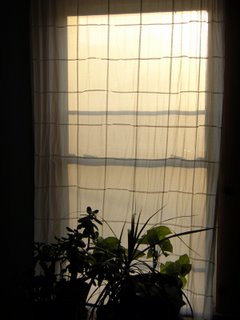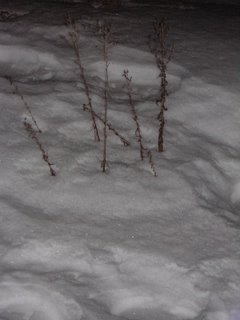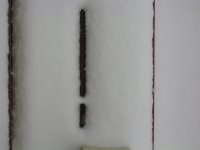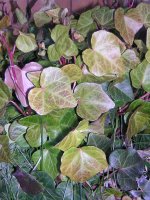DECEMBER 31, 2005
 The Christian calendar is not mine in spirit, but it is impossible to duck the tendencies of a millenia. Light and shadows, insides and outsides, there is a persistent delimiting in a world that deserve deliberation. Nevertheless, on this holy day of endings and new beginnings, at the end of this tenth month of the pre-Roman calendar, I feel the gentle tug of nostalgia color my emotions and shuffle my thoughts. It is hard to buck tradition. Forgive me.
The Christian calendar is not mine in spirit, but it is impossible to duck the tendencies of a millenia. Light and shadows, insides and outsides, there is a persistent delimiting in a world that deserve deliberation. Nevertheless, on this holy day of endings and new beginnings, at the end of this tenth month of the pre-Roman calendar, I feel the gentle tug of nostalgia color my emotions and shuffle my thoughts. It is hard to buck tradition. Forgive me.When I began this project last February, I did so because I needed to write. It was no more complicated than that. As time wore on, as I kept at writing, through February, March, and April, what was at first a pushing kind of insistence about nature - lyrical, I think, but trying almost too hard - settled into a patterned juxtaposition. I wanted to find something stable and consistent against which to measure the unmeasured assaults of our current politics. I wanted to see how the war and the budget and sights and sounds blaring across the tv and internet measured up against the reality of everyday. How does the force of my government compare to the forces of nature? But it was not until late May, when I think I found a rhythm, when a sudden richness in things and subtler sense of connectivity began to emerge in the posts - it being spring no doubt contibuted to the seeming success. I posted nothing in June and not again until July 16 when I marked the rise of summer and made some bitter remarks about people who shall remained unnamed, but who deserved those bitter remarks (and much more) for what they do (or rather do not do) everyday. Then came August, the month of my birth, and I began to reference photographs and draw more accurate parallels based only on species' characteristics and the vile goings on in Washington. Through September, and the first part of October, I continued in this vein. These were the fruitful months, when the seeds planted in spring began to bear fruit. But, like the seasons, my own words waxed and waned across the year. By November, the posts were forceful and clear and well-developed, but scarce. There are only four posts from December. The year has been unique, and yet the curve of energy has been as familiar as tomorrow's sunrise. I bid 2005 farewell and welcome in the new year.
 This holly tree Ilex opaca, a known evergreen, seems to be sprouting new growth this week. The rains have saturated the soils and the warmish weather has encouraged growth. This traditional Christmas shrub is also used by herbalists in tea to ease the pain of fever and its berries are consumed by several native song birds. It was impossible to photograph in focus as if to say, "you and your probing eyes!" As if to mock me a little. The holly tree startled me growing this early in the year, or starting so late in the year - since it must have sprouted in mid-December. Do they grow this way ordinarily? Is this climate or species unique? It is the first growth of the year, its hearty red-edged leaves unafraid of frost-filled nights and the threat of snow. They clench their stalks like newborn lemurs on their mothers. And it will have a good head start on everything else in my yard and the ecosystems surrounding me this year. Tomorrow for politics again.
This holly tree Ilex opaca, a known evergreen, seems to be sprouting new growth this week. The rains have saturated the soils and the warmish weather has encouraged growth. This traditional Christmas shrub is also used by herbalists in tea to ease the pain of fever and its berries are consumed by several native song birds. It was impossible to photograph in focus as if to say, "you and your probing eyes!" As if to mock me a little. The holly tree startled me growing this early in the year, or starting so late in the year - since it must have sprouted in mid-December. Do they grow this way ordinarily? Is this climate or species unique? It is the first growth of the year, its hearty red-edged leaves unafraid of frost-filled nights and the threat of snow. They clench their stalks like newborn lemurs on their mothers. And it will have a good head start on everything else in my yard and the ecosystems surrounding me this year. Tomorrow for politics again.May your year be peaceful and prosperous in the most generous ways; may you flourish like wildflower after drenching spring rains. May you find your place, in every sense of the word. Happy 2006!







